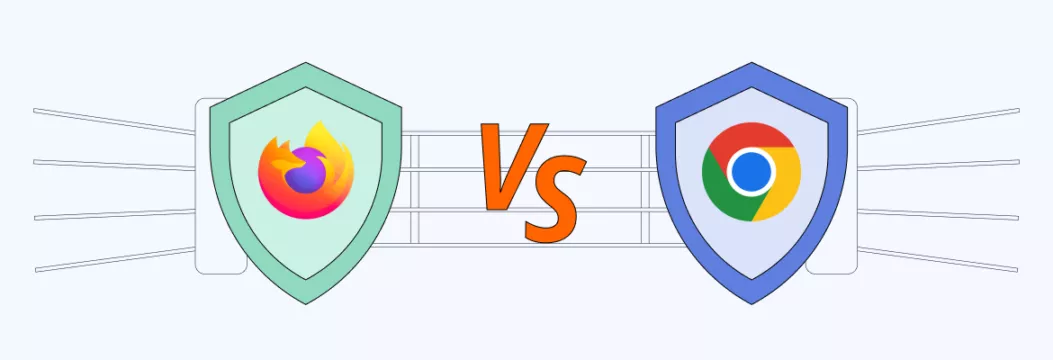Firefox vs. Chrome: Which Browser to Choose for Better Privacy?
Picking a web browser that is both safe and convenient may turn out to be a more challenging task than it seems. Most Internet users still prefer Chrome due to its seamless integrations with other Google services like Gmail and Google Maps. In fact, Chrome holds the majority of the global browser market share, making it the dominant choice for internet browsing worldwide. But if you want to share less of your data with this online advertising giant, you may consider an alternative solution like Mozilla Firefox. But is there any difference between these two browsers in terms of privacy and security, really? Read along for our comparative review of Firefox vs. Chrome and find some extra tips on how to protect yourself online.

How does a browser affect your Internet privacy?
Before we start to compare Firefox vs. Chrome, let’s briefly determine how a browser affects your Internet privacy and security and why its impact actually matters. Here are several factors to consider.
- Most browsers collect users’ data. When you launch a web browser, be it Chrome, Firefox, Safari, Edge, or whatever, you leave a digital footprint third parties can track. Your browser gathers information about your IP address, operating system, browser plugins, hardware details, and more. Most often, this data appears in the hands of advertisers and corporations striving to target you with tons of online ads. And don’t forget about cookies – those small pieces of private information you probably share with the websites you visit. Many sites also collect user data and suggest targeted ads, and while you can block specific sites from suggesting ads, this does not stop overall data collection and ad targeting across multiple sites.
- The Private Mode doesn’t always save the day. Almost every browser offers a “private browsing” option – you just need to open a “private window” and surf the web without being traced.. Well, almost. There is one significant “but” here: the private mode doesn’t really make your Internet activities private. In fact, your Internet service provider (ISP), employer or school, and websites you visit can still track you. Moreover, your browsing history is removed only after you close the private window. Therefore, instead of relying on the “incognito mode,” it’s worth empowering your cybersecurity toolkit – more on that in a bit.
- Hackers can take advantage of your browsing data. The most widespread technique cybercriminals use to make it possible is browser fingerprinting. It allows them to learn your system’s configuration and identify your “fingerprint” across the web. Basically, it means that all the data collected by your browser may eventually fall into the wrong hands.
Clearly, your browser does impact your online privacy. Privacy and security issues are a major concern for users when choosing a browser. And while some of them offer decent solutions to protect users from third-party monitoring and potential cybersecurity risks (for more details, check out our blog post about the safest Internet browsers), others may not be as efficient. All in all, it depends on multiple factors we are about to discuss.
Now, let’s take a closer look at our today’s contestants to determine whether Chrome or Firefox is a better option for your privacy and overall browsing experience.
Firefox vs. Chrome. A brief overview
If you don’t want go through our detailed comparison of Firefox and Chrome, here is a brief overview of each browser’s main characteristics and features.
At this point, you might think these browsers are almost the same. Both support multiple operating systems and offer some essential privacy and security features. Chrome offers a wide range of options for extensions, tab management, and customization. Most other browsers lack some of the comprehensive features found in Chrome and Firefox. But there are many more things to consider before making your final decision. So, let’s dive deeper into our Mozilla Firefox vs Google Chrome comparison.
Round 1. Performance
Let’s begin our battle with the Chrome vs. Firefox performance comparison.
Both applications provide a relatively high Internet speed with no excessive lags. In fact, your chosen web browser isn’t the main factor influencing your connection quality. If you regularly face unreasonable speed and bandwidth limitations, it might be due to Internet throttling applied by your ISP – check out our recent blog post on this topic to learn more.
Slow browsers do exist, but neither of our today’s rivals belong to them. Both browsers were tested using standard benchmarks to evaluate their speed and efficiency. Here are the results of a browser speed test we ran for Chrome:

And here’s Firefox performance score based on the same test:

As for Random Access Memory (RAM) usage, there are several factors that explain why a particular browser consumes too much memory. Having many open tabs can significantly impact performance and memory consumption. Users frequently have multiple tabs and pages open, which can affect browser speed and efficiency. Some of the most common causes are a large number of extensions and add-ons, too many tabs opened, or even malware sitting in your system.
But to make this comparison as objective as possible, we ran a small test to check which browser consumes more RAM. To do that, we played the same YouTube video in Chrome and Firefox—a common way to test browser performance with videos—and reviewed their performance via Activity Monitor. Here is the result.

As you can see, Firefox is a much more RAM-consuming browser than Chrome. Multiple complaints on Internet forums and social media platforms like Reddit also prove this point.
Firefox hoarding massive amount of memory/RAM within 30 minutes of openingby u/evwon in firefox
🏆 Who wins: Chrome
Both browsers handle multiple pages and open tabs efficiently, but user habits—such as frequently opening many tabs or streaming videos—can influence overall performance.
Round 2. Ease of use
Although it doesn’t really impact your privacy and security, convenience and ease of use are also critical for your browsing experience. So, which one is more user-friendly – Firefox or Chrome? Here are several important aspects to consider.
- Usability. Both browsers have seamless interfaces that are easy to navigate and customize to your needs. All in all, the visual difference between them is insignificant.
- Tabs. In Chrome, you can group tabs to avoid overwhelming your browser window. In contrast, Firefox provides a horizontal scroll instead of the grouping option.
- Search. Chrome and Firefox have Google as their default search engine. Although Chrome is a Google product and Firefox is not, both browsers support all of its major features, including Google Lens.
- Compatibility. Most major operating systems and platforms, including Windows, macOS, Linux, iOS, and Android, support both browsers. On top of that, Google Chrome is compatible with ChromeOS – a Linux-based operating system designed by Google.
- Integrations. Here, Chrome has an obvious advantage over Firefox, as it’s completely integrated into Google’s services most of us use. They include Gmail, Google Drive, Google Docs, Google Meet, Spreadsheets, Calendar, YouTube, and more. In turn, some specific features facilitating the use of those services, such as shortcuts, aren’t available for Firefox users. Additionally, Chrome allows users to import data from other browsers with just a click, making the transition process simple.
- Data saving and images. Both browsers offer options to manage images for data saving. Chrome’s lite mode compresses images to reduce data usage, while Firefox allows users to disable images entirely for similar benefits.
To conclude, both browsers offer a convenient and straightforward user experience. However, due to the smoothly integrated Google services, we will give preference to Chrome in this round.
🏆 Who wins: Chrome
Round 3. Privacy and security features
When comparing Firefox vs. Chrome security and privacy features, both cover the essentials, including the following ones:
- HTTPS-Only support
- Malicious website detection based on Google Safe Browsing
- Malware detection
- Privacy sandbox
- Private browsing mode (Incognito Mode in Chrome and Private Browsing in Firefox)
- Password manager
Chrome’s privacy sandbox and integrated security features, such as site isolation and advanced phishing protection, provide additional layers of defense for users.
But when it comes to more advanced online safety settings, Firefox is a much more privacy-friendly browser. After all, Chrome is one of Google services and belongs to the corporation famous for collecting massive amounts of customer data, including location, search history, browsing habits, and more.
Here are several privacy and security features that make Firefox stand out from Chrome and other popular web browsers.
- Enhanced Tracking Protection. Firefox allows you to stop unwanted third-party monitoring detected by the browser. Besides, it may also serve as an ad-blocker (however, to avoid all kinds of intrusive ads and pop-ups, you may want to use a more powerful ad-blocking extension).
- Advanced security settings customization. While the default Firefox privacy settings are quite impressive, you can take your data protection to the next level by adjusting them to your specific needs. In particular, Firefox lets you stop cookies and social media trackers (for instance, prevent Facebook from collecting your data when you’re not using the platform).
- Better threat protection. You can adjust Firefox settings to prevent various types of online threats, including crypto-mining scripts, fingerprinting, phishing, and potential data breaches. Completing security checks or verification processes in Firefox helps confirm you are human and protects against online threats.
- Open-source nature. Mozilla is a completely open-source project. It means that any developer can look under the hood of its code and check whether there is no backdoor for tracking customer data. In contrast, Chrome is only partly open-source based on Chromium, while many of its components remain proprietary. Both Mozilla and Google have teams of developers who frequently release security updates and patches to address vulnerabilities and improve user protection.
- Browser extensions. Firefox introduced browser extensions before Chrome, setting a precedent for browser customization and user control.
All in all, when comparing Chrome vs. Firefox privacy and security, the Mozilla browser confidently outperforms Google’s solution. Firefox’s privacy features were designed from the ground up to prioritize user security. Even Tor – the browser used for anonymous communications and access to the dark web – teams up with Mozilla in their privacy-focused project called Polaris.
🏆 Who wins: Firefox
Round 4. VPN
Neither Firefox nor Chrome offers a built-in virtual private network (VPN) solution. Mozilla has a VPN, but it’s a paid subscription-based service not included in the Firefox browser. As for Chrome, it provides a VPN for Google One cloud-storage subscribers (however, it has several significant pitfalls – read our recent blog post on this topic to learn more). Additionally, Chrome allows users to send web pages to their connected devices, making it convenient to continue browsing seamlessly across different platforms.
But is it a big deal that you don’t get a VPN by default when using a web browser? In general, not really. Some browsers, including Opera, Avast, and Brave, have built-in VPNs. However, these are rather lightweight tools that don’t provide a wide range of privacy and security perks.
🏆 Who wins: Draw
Luckily, there is a way out here – you can easily set up a VPN extension on Firefox or Chrome. Here is why this solution is worth it.
Why use a VPN for your browser
Here are several main reasons why you need a VPN, no matter which browser you’re using.
- A VPN encrypts your traffic. Reliable end-to-end encryption ensures that your search requests, messages, and other online communications won’t be visible to nosy third parties, from your ISP to hackers and snoopers.
- A VPN protects you from cyber threats. A virtual private network is an effective measure against different types of online dangers, from public Wi-Fi risks to distributed denial-of-service (DDoS) attacks, malicious links, and phishing websites.
- A VPN prevents third-party monitoring. A privacy-friendly browser like Firefox can protect you from unwanted tracking to some extent. But if you want a truly powerful shield for your digital identity, a VPN is a must. It can even change your location on Chrome, Firefox, or any other browser, making your online presence untraceable.
- A VPN blocks intrusive ads. A reliable VPN works as an efficient ad-blocking tool. It stops annoying and potentially malicious ads from popping up on your screen, ensuring a smoother and less disruptive browsing experience.
- A VPN provides access to the free Internet. A VPN is an excellent way to avoid online censorship and surf the web without limitations. In particular, you can access the desired websites and platforms when traveling to countries with a low level of Internet freedom.
Note that when choosing a VPN for your browser, prioritize reputable service providers with a proven track record and transparent No Logs policy. The thing is that some free VPN services may appear to be fake tools compromising your private data and selling it to third parties.
That said, we recommend VeePN – a reliable VPN service that covers your traffic with the top-notch AES-256 encryption standard empowered with the most efficient VPN protocols to date. Besides, VeePN provides a bunch of reliable security features, including NetGuard to avoid third-party tracking and online threats and Kill Switch to prevent potential leakage of sensitive data.
VeePN offers solutions for both browsers – a VPN for Firefox and a VPN for Chrome. But note that these extensions are lightweight solutions that work on the browser level only. In contrast, if you download the full-fledged VeePN app for a PC or any other device, you will cover your entire Internet traffic with reliable encryption and prevent any attempts to compromise your online privacy.
Verification and authentication: How do Firefox and Chrome protect your identity?
Verification and authentication are at the heart of a secure browser experience, ensuring that users can trust the websites they visit and that their identities remain protected online. Mozilla Firefox, as a secure browser with a strong non-profit focus, puts user privacy and security at the forefront of its verification process. When you attempt to access a site, Firefox carefully checks the connection, using advanced verification protocols to confirm that the site is legitimate before proceeding. This sometimes results in a slightly longer “verification successful waiting” period, but it means Firefox is diligently working to keep your data safe from trackers, ads, and malicious actors.
Google Chrome, on the other hand, leverages Google’s powerful authentication systems to verify user identities quickly and efficiently. Chrome’s integration with Google’s ecosystem allows for a faster verification process, making it a popular choice for users who value speed and seamless access. However, this convenience comes with a trade-off: Chrome’s profit-driven model means that user data may be used to serve personalized ads and enhance Google’s data collection efforts.
Both browsers employ technologies like ray ID and ray I to enhance security, helping to identify and block suspicious activities that could compromise user privacy. While Chrome’s approach is optimized for speed and integration, Firefox’s commitment to privacy and its non-profit mission give it an edge for users who prioritize security and control over their online identity. Ultimately, the choice of primary browser depends on your preferences—whether you value a privacy-focused, secure browser like Firefox or the fast, integrated experience offered by Chrome.
Mobile app and cross-device compatibility: Privacy on the go
In today’s connected world, having a browser that works seamlessly across all your devices is essential. Both Firefox and Chrome offer robust mobile apps, but their approaches to privacy and data collection set them apart. Firefox’s mobile app, available on Windows, Android, and other platforms, delivers a standard browsing experience with intuitive tab management and a user-friendly address bar. It stands out for its built-in tracking protection and ad-blocking features, helping users maintain privacy even when browsing on the go.
Chrome’s mobile app, meanwhile, is deeply integrated with Google’s suite of services. Users can easily sync bookmarks, passwords, and preferences across devices, making it a convenient choice for those already invested in the Google ecosystem. However, Chrome’s default settings enable extensive data collection, allowing Google to use your browsing habits to serve targeted ads and personalize your experience.
For users who prioritize privacy, Firefox’s mobile app offers a clear advantage, focusing on minimizing tracking and giving users more control over their data. Those who value convenience and cross-device integration may find Chrome’s features more appealing, despite the potential privacy trade-offs. Safari users may also appreciate their browser’s strong focus on privacy and security, making it another solid option for privacy-conscious individuals. Ultimately, the best choice depends on your personal focus—whether it’s privacy, convenience, or seamless access to your saved bookmarks and preferences across all your devices.
User profiles and data synchronization: Managing your data across devices
Managing your online life across multiple devices is easier than ever, thanks to user profiles and data synchronization features built into modern browsers. Both Firefox and Chrome allow users to create profiles and sync important data like bookmarks, passwords, and browsing history, ensuring a smooth experience whether you’re on your laptop, phone, or tablet.
Firefox takes a privacy-first approach to user profiles and data synchronization. As a browser developed by a non-profit organization, Firefox does not collect user data for ads or profit, giving users greater control over their information. Your bookmarks, passwords, and preferences are synced securely, and you can rest assured that your data isn’t being used to build advertising profiles or track your activity across the web.
Chrome, in contrast, ties user profiles directly to Google accounts, enabling comprehensive data synchronization across all Google services, including Gmail, Google Drive, and Google Docs. This integration offers unmatched convenience, but it also means that your browsing data may be collected and used for targeted ads and other purposes. For users who value seamless access and integration with Google’s ecosystem, Chrome’s features are hard to beat.
Ultimately, the choice between Firefox and Chrome comes down to your priorities. If you want maximum control over your data and a focus on privacy and security, Firefox’s user profiles and synchronization features are the better fit. If you prefer the convenience of having all your data and preferences accessible across Google’s services, Chrome may be the right choice. Consider your own preferences for privacy, data collection, and integration when deciding which browser best meets your needs.
Google Chrome vs. Firefox: Who wins the battle?
When it comes to the overall browsing experience, both Chrome and Firefox are quite convenient, easy to use, and fast. Chrome consumes less RAM and offers seamless integrations with other Google services, including Gmail, Google Drive, and Google Maps. But in terms of privacy-related features, Firefox has much more to offer. It comes with more efficient solutions against third-party monitoring, cookies, and potential threats.
Ultimately, users will be happy with either browser depending on their priorities—whether they value privacy or convenience.
But whether with Chrome or Firefox, you can take your Internet security to the next level with a trustworthy VPN like VeePN. It will encrypt your data and leave no chance for snoopers to trace your online activities. Try VeePN now with a 30-day money-back guarantee and surf the web with peace of mind, no matter which browser you’re using.
FAQ: Firefox vs. Chrome
It depends on your main priorities when using a browser. Chrome has a slightly better performance in terms of its connection speed and RAM consumption. Besides, it’s smoothly integrated into other Google services, including Gmail and Google Drive. However, Firefox is a much more privacy- and security-friendly browser, with many extra features against third-party tracking and potential cyber threats. For more details, read this article.
Yes, Firefox is a more secure browser than Chrome. It’s completely open-source, so anyone can check the technology behind it. Besides, Firefox provides multiple additional security features to protect users from crypto-mining scripts, fingerprinting, phishing, and so on. Check out this article to learn more.
Yes, Firefox enables more privacy features than Chrome. In particular, it blocks third-party cookie tracking and many other monitoring tools by default. Also, Firefox has more advanced privacy and security settings customization – for instance, you can block social tracking conducted by platforms like Facebook. Read this article to learn more.
No, the connection speed of both browsers is rather equal. In fact, Chrome consumes less memory, so it often works even faster than Firefox. For more details, read this article.
Firefox uses significantly more RAM, according to the latest tests and users’ feedback. Chrome is nearly half less RAM-hungry than Firefox. To overcome memory consumption issues, Firefox offers a built-in task manager that reports which tabs are the most resource-intensive. Besides, it provides the Add more RAM function for troubleshooting.
Most likely, people switch from Chrome and other popular browsers to Firefox to enhance their Internet privacy and protection. Besides, many ad-blocking extensions don’t work on Chrome because of Google’s Manifest V3 technology. However, note that it may not be enough to use a privacy-friendly browser to protect your digital identity. It’s worth sticking to some essential cyber hygiene practices and using efficient online security tools like a VPN. Check out this article for more details.
VeePN is freedom
Download VeePN Client for All Platforms
Enjoy a smooth VPN experience anywhere, anytime. No matter the device you have — phone or laptop, tablet or router — VeePN’s next-gen data protection and ultra-fast speeds will cover all of them.
Download for PC Download for Mac IOS and Android App
IOS and Android App
Want secure browsing while reading this?
See the difference for yourself - Try VeePN PRO for 3-days for $1, no risk, no pressure.
Start My $1 TrialThen VeePN PRO 1-year plan








